

FBI Seized Congressional Cellphone Records Related to Capitol Attack. Journalists, Lawyers & Activists Targeted in Sweeping U.S. Intelligence Gathering Effort on Border. This is a rush transcript.

Copy may not be in its final form. “Quiet Skies”? Boston Globe Exposé Reveals TSA Is Secretly Surveilling Thousands of U.S. Travelers. This is a rush transcript.

Copy may not be in its final form. AMY GOODMAN: This is Democracy Now! , Democracynow.org, The War and Peace Report. I’m Amy Goodman. JUAN GONZÁLEZ: And I’m Juan González. A Boston Globe investigation has revealed the existence of a domestic surveillance program run by the Transportation Security Administration, or TSA, which has been shadowing U.S. citizens on planes and in airports since 2012. UNKNOWN: While air marshals typically have assisted the FBI and surveilled people on a terrorist watch list, “Quiet Skies” casts a wider net.
AMY GOODMAN: In the wake of The Boston Globe investigation, TSA officials have bowed to pressure from Congress and plan to meet with the House and Senate homeland security committees. Jana, welcome back to Democracy Now! JANA WINTER: Thanks for having me, and here’s what we know. Can We Stop America’s Surveillance State? With the publication of Glenn Greenwald’s new book on Edward Snowden and the NSA, the state surveillance issue is back in full force as if it ever went away.
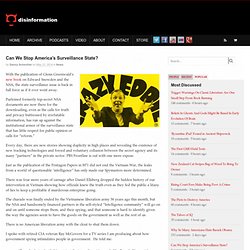
Purloined formerly top-secret NSA documents are now there for the downloading, even as the calls for truth and privacy buttressed by irrefutable information, has run up against the institutional armor of the surveillance state that has little respect for public opinion or calls for “reform.” Every day, there are new stories showing duplicity in high places and revealing the existence of new tracking technologies and forced and voluntary collusion between the secret agency and its many “partners” in the private sector.
PBS Frontline is out with one more expose. Has the NYPD’s Demographics Unit Stopped Any Terror Plots? There were those in the NYPD itself who’d begun to doubt the program’s efficacy.
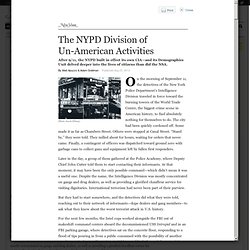
Hector Berdecia was one of those. A sturdily built NYPD lieutenant with a shaved head and broad, boyish smile, Berdecia inherited supervision of the Demographics Unit in 2006 after a yearlong tour in Iraq with the Army. He’d been in Iraq’s Babylon Province near the lawless area south of Baghdad dubbed the “Triangle of Death.” Berdecia had lived in and around New York all his life, but it was only after his tour that he noticed the many Arabic storefronts dotting New York. In Iraq, he had made Muslim friends and started a Cub Scout troop, using his son’s old troop banner. “They were here on 9/11,” Berdecia said. Netflix knows you have horrible taste. The Netflix recommendation engine can be baffling.

“Why is it suggesting that religious children’s cartoon?” We often ask, or, “Why didn’t it tell me I would like this gritty documentary about cocaine smugglers in the 1980s?” Strangest of all is when the site encourages you to watch a film that it thinks you’ll give a two-star rating. Adverts with eyes know when you're watching ... and they're already here. Though facial recognition software has been in our homes for some time (having been a feature in Picasa and iPhoto since 2009), the prospect of being the unwitting subject of similar technology while out and about is an alien one.

That could be about to change thanks to the announcement of OptimEyes, a system designed to be fitted to digital advertising hoardings in Europe to gauge just who is paying attention. Developed by "audience measurement" specialists Quividi (literal translation from Latin: I saw that) for advertising company Amscreen, OptimEyes won't, Amscreen says, identify individuals, but instead be used to gauge the number and type of people paying attention to particular adverts.
Vehicle Records Taken By Law Enforcement Agencies Across America: ACLU. WASHINGTON -- You can drive, but you can't hide.

A rapidly growing network of police cameras is capturing, storing and sharing data on license plates, making it possible to stitch together people's movements whether they are stuck in a commute, making tracks to the beach or up to no good. 5 things you need to know about government spying. In the past 36 hours, a veritable flood of information about the government’s massive spying operation on its own citizens has been revealed, from the initial Guardian report to blockbuster revelations in the Washington Post about Internet snooping.
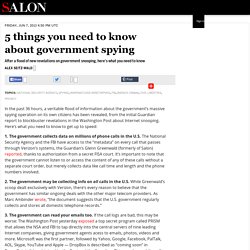
Here’s what you need to know to get up to speed: 1. The government collects data on millions of phone calls in the U.S. The National Security Agency and the FBI have access to the “metadata” on every call that passes through Verizon’s systems, the Guardian’s Glenn Greenwald (formerly of Salon) reported, thanks to authorization from a secret FISA court. Obama Administration Releases Nation’s Phone Records To Public. WASHINGTON—On the heels of reports that the National Security Agency has secretly been amassing the private telephone records of Verizon’s more than 120 million customers, President Barack Obama announced Thursday that his administration is releasing the entire country’s phone records to the public in an effort to handle the situation with complete transparency.
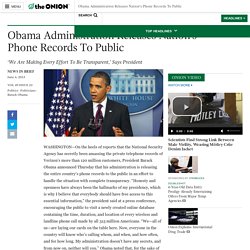
“Honesty and openness have always been the hallmarks of my presidency, which is why I believe that everybody should have free access to this essential information,” the president said at a press conference, encouraging the public to visit a newly created online database containing the time, duration, and location of every wireless and landline phone call made by all 315 million Americans. “We—all of us—are laying our cards on the table here. Now, everyone in the country will know who’s calling whom, and when, and how often, and for how long.
The Best Stories on the Government’s Growing Surveillance. For background on the National Security Agency’s collection of phone and web records, here’s the best reporting on what else the government has been tracking.
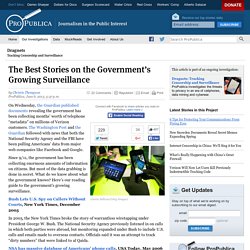
On Wednesday, the Guardian published documents [1] revealing the government has been collecting months’ worth of telephone “metadata” on millions of Verizon customers. The Washington Post [2] and the Guardian [3] followed with news that both the National Security Agency and the FBI have been pulling Americans’ data from major web companies like Facebook and Google. Since 9/11, the government has been collecting enormous amounts of information on citizens. But most of the data grabbing is done in secret. Mass Surveillance in America: A Timeline of Loosening Laws and Practices. Director of National Intelligence James Clapper Following the publication of the Guardian’s story about the Verizon order, Sens.
Feinstein and Saxby Chambliss, R-Ga., the chair and vice of the Senate intelligence committee, hold a news conference to dismiss criticism of the order. “This is nothing particularly new,” Chambliss says. “This has been going on for seven years under the auspices of the FISA authority, and every member of the United States Senate has been advised of this.” Director of National Intelligence James Clapper acknowledges the collection of phone metadata but says the information acquired is “subject to strict restrictions on handling” and that “only a very small fraction of the records are ever reviewed.” NSA Whistleblowers: "All U.S. Citizens" Targeted by Surveillance Program, Not Just Verizon Customers. Guests William Binney served in the National Security Agency almost 40 years, including a time as director of the NSA’s World Geopolitical and Military Analysis Reporting Group.
Shayana Kadidal. FBI's Proposed CALEA Law Would Require Websites And Devices To Be Wiretap-Ready. Providers of email, chat, and messaging services used by a significant number of people would be required to enable easy wiretapping, if the FBI has its way, CNET News reports: The FBI is asking Internet companies not to oppose a controversial proposal that would require firms, including Microsoft, Facebook, Yahoo, and Google, to build in backdoors for government surveillance. In meetings with industry representatives, the White House, and U.S. senators, senior FBI officials argue the dramatic shift in communication from the telephone system to the Internet has made it far more difficult for agents to wiretap Americans suspected of illegal activities. The FBI general counsel’s office has drafted a proposed law requiring that social-networking Web sites and providers of VoIP, instant messaging, and Web e-mail alter their code to ensure their products are wiretap-friendly.
Yes, Big Brother Is Watching You - The ITT List. It’s been a frightening few weeks for journalists concerned with protecting their sources—and for Americans concerned with protecting their privacy. On May 13, the Associated Press revealed that the Justice Department secretly obtained two months of reporters’ call logs. Citing the Espionage Act, which prohibits the disclosure of classified information, the Justice Department had subpoenaed Verizon Wireless for the call logs of more than 20 AP phone lines. Within a week The Washington Post reported that in 2010 the DOJ had subpoenaed emails from Fox News’ chief Washington correspondent James Rosen's personal Gmail, also with the motive of prosecuting leakers. The Return of COINTELPRO? “Democracies die behind closed doors” – Judge Damon J. Structural Rights in Privacy by Harry Surden.
This Essay challenges the view that privacy interests are protected primarily by law. Instead, I argue that much of society's privacy is protected implicitly by transaction costs. Collateral damage of our surveillance state. Surveillance and Security Lessons From the Petraeus Scandal. Paula Broadwell’s big mistake. The funny thing is, Paula Broadwell and David Petraeus thought they knew what they were doing. When Will our Email Betray Us? An Email Privacy Primer in Light of the Petraeus Saga. The unfolding scandal that led to the resignation of Gen.
David Petraeus, the Director of the Central Intelligence Agency, started with some purportedly harassing emails sent from pseudonymous email accounts to Jill Kelley. FBI's abuse of the surveillance state is the real scandal needing investigation. The Petraeus scandal is receiving intense media scrutiny obviously due to its salacious aspects, leaving one, as always, to fantasize about what a stellar press corps we would have if they devoted a tiny fraction of this energy to dissecting non-sex political scandals (this unintentionally amusing New York Times headline from this morning - "Concern Grows Over Top Military Officers' Ethics" - illustrates that point: with all the crimes committed by the US military over the last decade and long before, it's only adultery that causes "concern" over their "ethics").
Inquiry Cites Flaws in Regional Counterterrorism Offices. US rapidly increased electronic surveillance. Justice Department's Warrantless Spying Increased 600 Percent in Decade. Source: American Civil Liberties Union The Justice Department use of warrantless internet and telephone surveillance methods known as pen register and trap-and-trace has exploded in the last decade, according to government documents the American Civil Liberties obtained via a Freedom of Information Act claim. Pen registers obtain, in real time, non-content information of outbound telephone and internet communications, such as phone numbers dialed, and the sender and recipient (and sometimes subject line) of an e-mail message. A trap-and-trace acquires the same information, but for inbound communications to a target.
No probable-cause warrant is needed to obtain the data. Judges are required to sign off on these orders when the authorities say the information is relevant to an investigation. According to the ACLU: Even more alarming, the latest figures — which were for years 2010 and 2011 — open only a tiny window into the U.S. surveillance society. License-Plate Scanners Have Your Number. Warrantless Electronic Surveillance Surges Under Obama Justice Department. CV Dazzle: Camouflage From Computer Vision by Adam Harvey. FBI begins installation of $1 billion face recognition system across America.